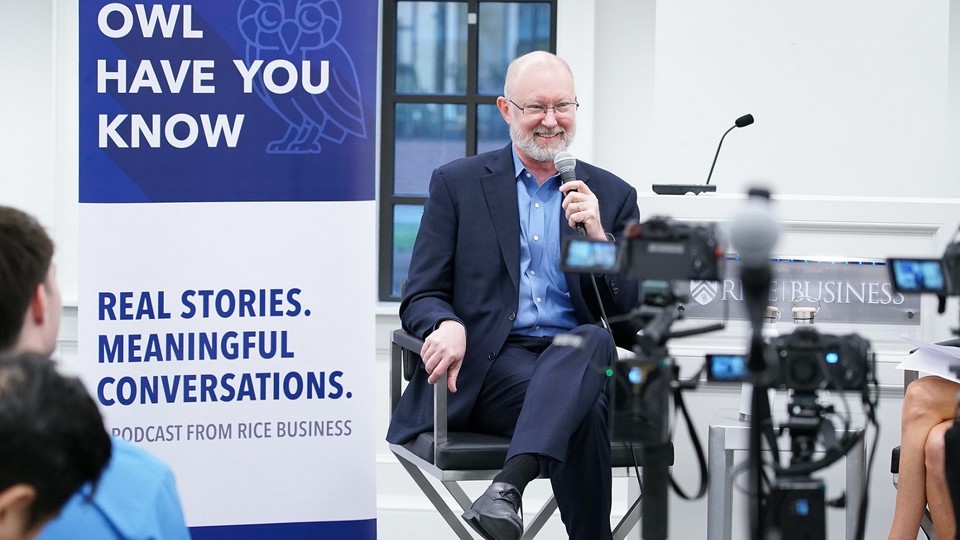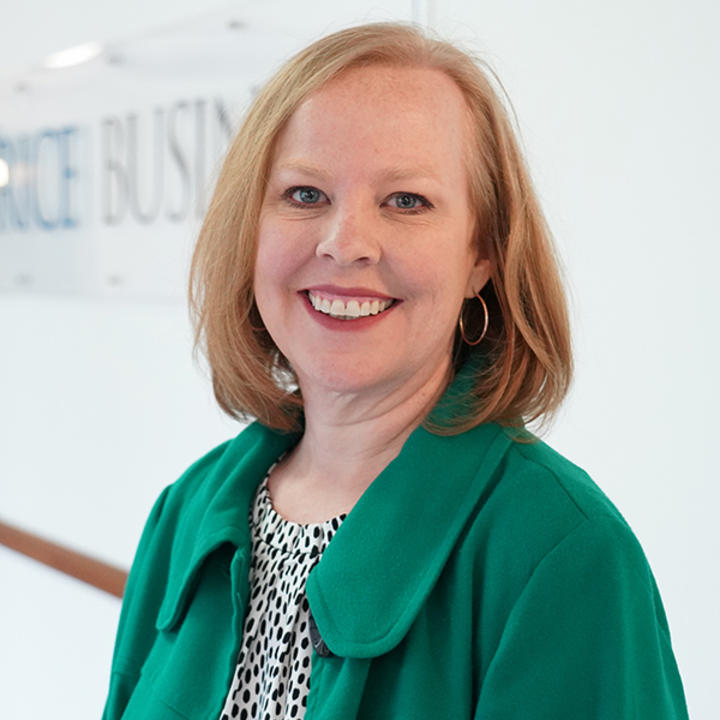Hungry for Innovation feat. Aaron Knape ’08
Season 1, Episode 2
Host Christine Dobbyn talks with Aaron Knape ’08, cofounder of sEATz, an in-seat food delivery app for live sports and entertainment events. Aaron discusses the height of the pandemic in the U.S. when most sporting events were cancelled and fans were not allowed in stadiums, as well as developments with sEATz as venues reopen to the public.
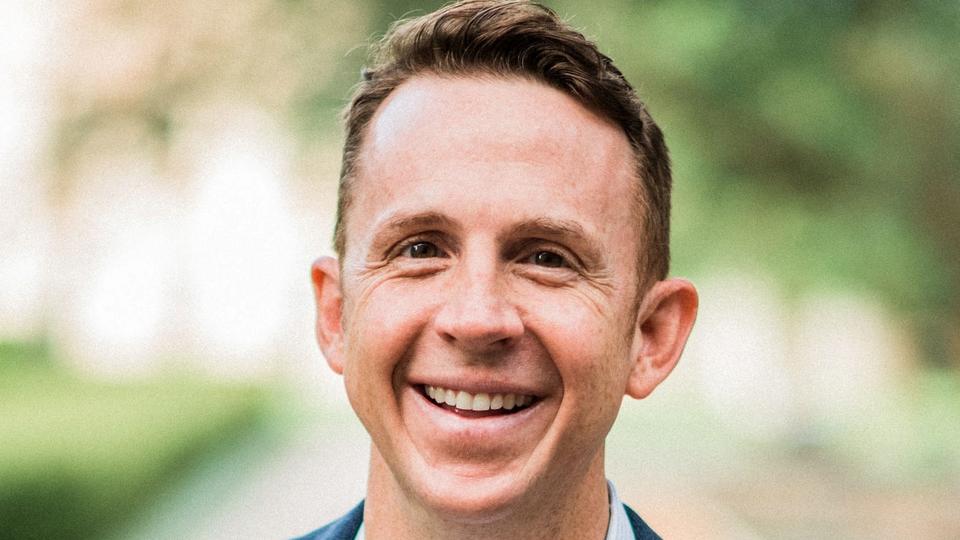
Owl Have You Know
SEASON 1, EPISODE 2
Host Christine Dobbyn talks with Aaron Knape ’08, cofounder of sEATz, an in-seat food delivery app for live sports and entertainment events. Aaron discusses the height of the pandemic in the U.S. when most sporting events were cancelled and fans were not allowed in stadiums, as well as developments with sEATz as venues reopen to the public.
Subscribe to Owl Have You Know on Apple Podcasts, Spotify, Youtube or wherever you find your favorite podcasts.
You May Also Like
Women Who Mean Business: Meet HBJ's 2020 energy honorees
Congratulations to Cyndie Fredrick, Rice MBA '06 and Senior Vice President and General Manager for Merichem Co, who was awarded a Women Who Mean Business Award by Houston Business Journal for her leadership in energy.
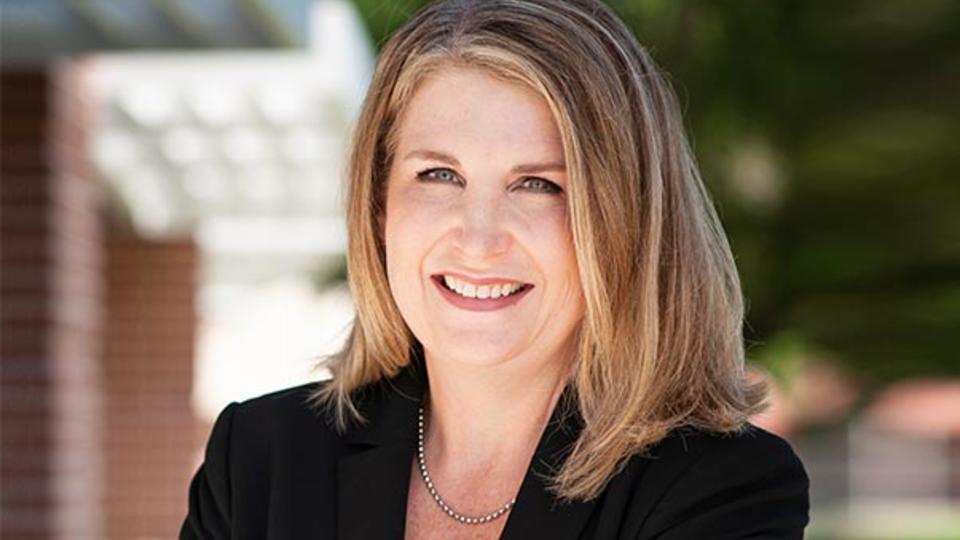
Texas unemployment rate rises to 8.3% in September, seven months into economic recession
Peter Rodriguez, dean of the Jones Graduate School of Business, called the recent increase in layoffs “evidence that we didn’t take the short route out of the recession. We’re going to be here for a little while."

Meet The Rice Jones MBA Class Of 2022
Take a look at some of the most promising MBAs from the Class of 2022 at Rice University's Jones Graduate School of Business.

Small Biz Insider: Entrepreneur Sets Out to Create Solution She Wanted for Herself, Other Working Moms
Returning to work after having a baby can be pretty stressful. Abbey Donnell, founder and CEO of Work and Mother and Rice MBA '17, lays out barriers for new moms and how her company might be a solution on this new podcast episode.
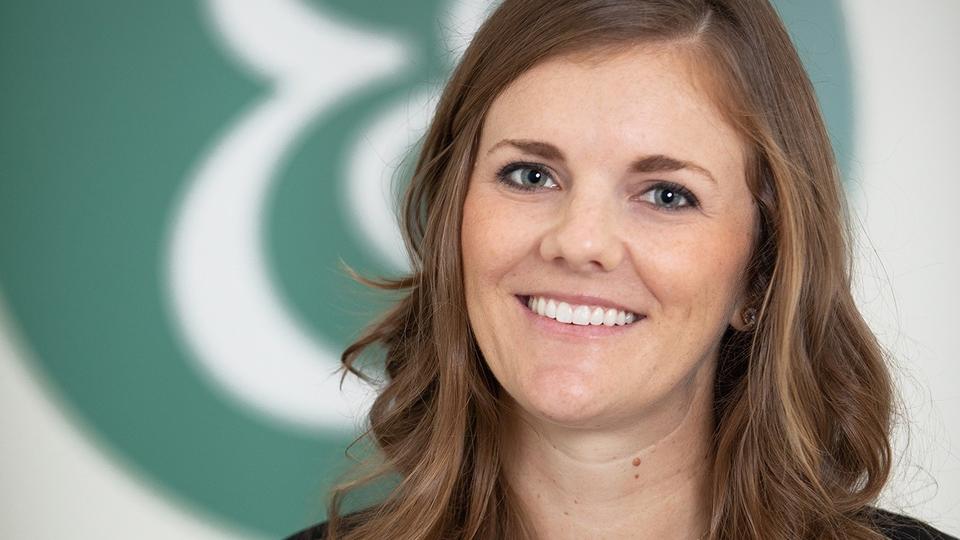
Shelby Hillman
Shelby Hillman, Professional MBA '22
A Day in The Life of A Rice MBA: PMBA Launch
Professional MBA student Shelby Hillman takes you along on her Launch journey and offers an inside look at what Rice Business is doing to keep students safe for a return to campus.
Keep Exploring
Sophie Randolph
Sophie Randolph, Full-Time MBA '22
A Day in The Life of A Rice MBA: Launch
Follow Full-Time MBA student Sophie Randolph as she starts Rice Business with dual delivery sessions and travels to campus to meet fellow MBA first years face-to-face (with 6 foot distance). Physically distant, but socially together.
Keep Exploring
How to Break Beyond the Bottom Line feat. Bethany Andell ’01
Season 1, Episode 1
Rice Business graduate Bethany Andell ’01, president of Savage Brands and current president of the Rice Business Alumni Board speaks about her passion for helping the corporate world get back to a place where people trust, respect and love business.

Owl Have You Know
SEASON 1, EPISODE 1
David Droogleever speaks with fellow Rice Business graduate Bethany Andell ’01, president of Savage Brands and current president of the Rice Business Alumni Board. Bethany spoke with David back during the summer of 2020 about her passion on helping the corporate world get back to a place where people trust, respect, and love business.
A special “thank you” to Rice Business alumna and former alumni board member Karen Crofton for her work on this podcast project. Without your enthusiasm and hard work, none of this would be possible.
Subscribe to Owl Have You Know on Apple Podcasts, Spotify, Youtube or wherever you find your favorite podcasts.
You May Also Like
Jobs Report: Rice MBA Job Placement During the Pandemic
Top leaders are experts at managing change. Now nimbleness, quantitative strength and strategy skills are more important than ever for landing a job. What should Rice MBA students know about the recruiting outlook? A Q&A with Jessica Campbell of the Rice Business Career Development Office.


Can A Rice MBA Help You Navigate The COVID Era?
We recognize that strong job placement statistics and career outcomes are crucial factors in selecting the right MBA program. With an outstanding track record of job placement, our graduates are equipped to succeed, even in challenging environments.
Q and A with Jessica Campbell, Rice Business Director of Corporate and Employer Relations
Even in good times, top leaders are experts at managing change. Now, during the pandemic, nimbleness, quantitative strength and strategy skills may be more important than ever for landing a job. Rice Business has seen its highest enrollment ever this year, thanks in part to the changing career landscape. So, what should Rice MBA students know about the recruiting outlook? Jessica Campbell, director of corporate and employer relations at the Rice Business Career Development Office, offers valuable insights into the evolving job market and how the Rice MBA program adapts to meet its demands.
Industry Will Be Rebuilding
Q. What’s the first thing Rice MBA students should know about the recruiting environment?
A. The most important thing to know is that there are reasons for optimism. COVID-19’s impact on the economy is unique: the pandemic forced shutdowns to try to avoid an even worse catastrophe. Right now, COVID-19 is continuing to alter consumer behavior. Once the pandemic is under control, the economy should bounce back.
In fact, employers are expecting a rebound in MBA hiring in 2021, according to the annual GMAC survey. Before COVID-19, 92% of firms sampled said they planned to hire MBA graduates in 2020. That dropped to 77% during the pandemic. But when employers were asked about 2021, nearly 90% voiced plans to hire MBAs – close to pre-COVID levels.
Q: What are common questions from prospective students?
A: We’re getting lots of questions around GMAT scores, given the difficulties around testing. So we took that question to our employers and asked whether or not GMAT scores were necessary this year. Some maintained that GMAT scores are still absolutely necessary. Others said they will be one data point among many. Certainly, for some industries like consulting and investment banking, taking the GMAT and having a solid score makes it a much easier process.
The Internet Opens Doors
Q: What questions are you hearing from first year students?
A: We’re getting lots of questions around how many hires to expect from consulting firms. Most of these firms don’t know or aren’t yet sharing this information. We do know that consulting is always competitive, and we expect that will be especially true this year. So it’s important for students to have a range of options. It’s critical to start networking early and do your research in order to stand out.
Interestingly, students are also discovering advantages to the online job search. In a recent column, our first-year MBA student Katie Chung wrote, “The internet opens doors. You can start your day with a meeting in Europe and end your day with a session in Asia … going virtual has provided the opportunity to reconnect with alumni who can, in turn, help current students recruit.”
Interested in Rice Business?
Employers Have Learned To Stay Engaged
Q: What’s changed about recruiters’ practices?
A: Employers have shifted to virtual recruiting for this year. Companies will return to campus physically as circumstances allow, but I anticipate that virtual recruiting will stick around. Employers have been increasing virtual recruiting efforts for years and COVID-19 accelerated this trend.
Employers also tell us they learned a lesson from 2008, when many companies disappeared from campus recruiting and then found real challenges as they returned to campus in subsequent years to recruit top talent. While a handful of employers won’t be recruiting at all this year, most of our corporate partners are staying engaged.
Meanwhile, we’ve modified all of our career education programming to reflect the virtual recruiting landscape. Students have always been able to record virtual mock interviews, but now they practice in the same format they’ll experience in their virtual interviews. And recruiting starts early! Even before the program starts, there are pre-MBA opportunities. So, although on-campus interviews for internships start in January, information sessions and coffee chats start the first week of school.
Q: What industries are most receptive to hiring right now?
A: The top four industries for our 2020 graduates were consulting (24.5%), financial services (22.3%), technology (20.2%) and petroleum/energy (12.8%). In fact, more of our MBAs accepted jobs in tech this year than in the preceding five years, and we anticipate that this could continue to grow. It’s a sector where we are focused on developing more relationships. We’re also reaching out to CPG companies, who are major recruiters for marketing MBAs. We’re ramping up outreach to these employers, some of whom who have not visited our campus. Virtual recruiting opens a really promising gateway to introduce these companies to our graduates.
Strategy, Communication, Versatility
Q: What skills do employers want?
A: What we hear from recruiters aligns with the GMAC Survey: Employers want strategic thinking, communication skills and versatility. Rice Business graduates are exceptionally well-trained in these areas. Their quantitative skills and the ability to make sense out of data are now reflected by the recent STEM designation of our entire program. Thanks to its size and culture, Rice Business is also outstanding at developing leaders. The diversity of both Rice Business and of Houston is another strength: our 35% minority student body made Rice Business the country’s No. 1 most diverse MBA program last year.
Alumni Offer Key Opportunities
Q: Are you changing your employer outreach strategies?
A: Absolutely. I think many of these changes will stick around beyond COVID-19.
Campus recruiting is 100% virtual this fall, and I expect it will remain so through the spring semester. Information sessions, coffee chats and interviews are all still happening, just in a virtual format. We’ve shifted our annual Diversity Networking Reception to a virtual networking event. And now that recruiting is virtual, we can engage with recruiters who don’t typically come to campus. Our information sessions are actually up from last fall. The recent addition of a third cohort, and our newly increased class size, may also attract more potential recruiters because of the larger candidate pool.
We also partner closely with External & Alumni Relations and Marketing and Communications on employer/alumni outreach. Our Rice Business alumni, in particular, are great advocates — a terrific resource for helping students get a foot in the door.
Keep Exploring
Out of Sync Earnings
Companies whose earnings are out of sync with the rest of their industry are more likely to misreport them.


Based on research by Brian R. Rountree, Shiva Sivaramakrishnan and Andrew B. Jackson
Companies whose earnings are out of sync with the rest of their industry are more likely to misreport them.
- Research shows that some corporate executives skew earnings to influence the market and inflate share price.
- The less in line a firm’s earnings are with its industry’s earnings, the more room a firm has to manipulate its earnings reports.
- A study of federal SEC enforcement actions reveals that firms with out-of-sync earnings are indeed more likely to misreport them.
Say a company called CoolConsumerGoodsCo (CCGC) has just released its quarterly earnings report, revealing significantly higher profits than its consumer goods industry counterparts.
That result might spur analysts to slap a buy rating on the stock and investors to snap up shares. In an ideal world, the market wouldn’t have to consider the possibility that the numbers aren’t legit — but then again, it’s not an ideal world. (Enron, anyone?)
Rice Business professors Brian R. Rountree and Shiva Sivaramakrishnan, along with Andrew B. Jackson at University of New South Wales in Australia, studied what makes business leaders more likely to engage in fraudulent earnings reporting. Specifically, they focused on the relationship between this kind of misrepresentation and the degree to which a company’s earnings are in line with the rest of its industry — a variable the researchers term “co-movements.”
Many people are familiar with a similar variable, calculated using stock returns often referred to as a company’s beta. The authors adapted the stock return beta to corporate earnings to see how a company’s earnings move with earnings at the industry level.
The researchers hypothesized that the less in sync a company’s earnings are with its industry, the higher the chance a company’s leaders will manipulate earnings reports. They started with the well-accepted premise that corporations try to skew earnings reports to influence the market. The primary motive is typically to raise the company’s stock price, as when an executive tries to “choose a level of bias” that balances potential fallout of getting caught against the benefits of a higher stock price.
To test their prediction, the professors analyzed a sample of enforcement actions taken by the U.S. Securities and Exchange Commission against companies for problematic financial reporting from 1970 to 2011 — although they noted that given the SEC’s limited resources, the number of enforcement actions probably underestimates the actual amount of earnings manipulation in the market.
Their analysis revealed that firms with low earnings co-movements (meaning their earnings were out of sync with industry peers) were more likely to be accused by the SEC of reporting misdeeds. They concluded that the degree of earnings co-movement determines the probability of earnings manipulation. Put another way, earnings co-movements are a “causal factor” in the chances of earnings manipulations — and to a significant degree. The researchers found that firms who don’t co-move with the market are more than 50 percent more likely to face an SEC enforcement action, compared with firms who are perfectly aligned with the market.
The researchers drilled deeper into the data to study whether the odds changed depending on the industry, since past research has indicated that the amount of competition in an industry works to constrain misreporting. That premise seems to hold true, the researchers concluded. In industries with more competitive markets, the impact of low co-movement on earnings manipulation is moderated.
They also studied whether the age of a firm played a part in the likelihood of earnings manipulation. Newer firms often rely more on stock compensation, which could be a motive for manipulating earnings reporting to drive up share price. Indeed, younger firms were more susceptible to misreporting when their earnings were out of whack with the rest of the marketplace.
Every firm faces some risk of misreporting, however. Even for public companies under analyst scrutiny, low co-movement proved to be a driver of earnings manipulation. But companies known for conservative reporting tend to be less likely to exaggerate their earnings, in general; these firms typically recognize losses in a more timely manner, the professors found.
These findings suggest a number of future lines of research. For example: When do executives underreport earnings? And can analyzing patterns related to cash flow reporting help better isolate earnings manipulation?
In the meantime, if you come across a company like CoolConsumerGoodsCo with an earnings report that’s widely out of sync with the rest of its industry, you might think twice before rushing to buy in.
Brian R. Rountree is an associate professor of accounting at the Jones Graduate School of Business at Rice University.
Shiva Sivaramakrishnan is the Henry Gardiner Symonds Professor of Accounting at Rice Business.
To learn more, please see: Rountree, B., Sivaramakrishnan, S., & Jackson, A. (2017). Earnings Co-movements and Earnings Manipulation. Springer Science+Business Media, 22, (1340-1365).
Never Miss A Story





